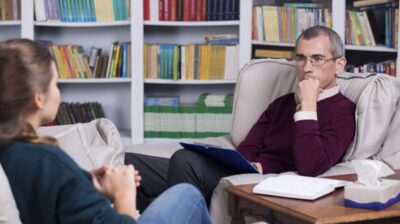Living with panic
A spunout contributor shares their experience with panic attacks and gives their tips on how to deal with them.

The first time I had a panic attack it completely freaked me out. I was at home and without any obvious reason, I suddenly felt as if I couldn’t breathe. My chest tightened, I started gasping for breath and I felt dizzy and scared about what was happening. After a minute or two, my breathing slowly returned to normal and apart from feeling a bit upset, shaky and shocked, I was back to myself.
Before that, I had never heard of panic attacks or their symptoms. I was 17, studying for the Leaving Cert and looking back, I was fairly stressed out. My father was sick, there was no shortage of family arguments and going home from school every evening felt claustrophobic.
I told my mother about what had happened and she took me to the doctor. I don’t know if I did a bad job of explaining it or what, but the doctor didn’t have any explanation or advice. For the rest of that year, I experienced panic attacks regularly, and although after the first one, I kinda knew that they would stop after a few minutes, they still freaked me out.
I didn’t tell anyone else about what was happening, I was embarrassed about it and always worried that someone would see me having a panic attack. After a few months, I read about panic attacks online and realised that these were what I was experiencing. I also started to recognise when a panic attack was beginning and sometimes I could calm myself down and prevent the panic from taking control. I noticed that the panic attacks arrived when I was very worried about something- be it school or home stuff, and I tried to stop myself from stressing out as much as I had been. However, all that took time and even after I finished the Leaving Cert exams, I still had panic attacks.
It really hit my confidence, especially if I had to talk in front of a lot of people or to people I didn’t know. Finally, the panic attacks stopped – partly, because I was in better form and happier, but also because I felt they were just my body’s physical reaction to the stress. By knowing what caused the panic, I felt less scared by the experience and that in turn, helped stop the attacks.
For a couple of years I avoided any situation which might trigger a panic attack, however, with time, I became braver and made an effort to confront situations that would have caused panic before. And during those few years, I managed NOT to have panic attacks when I was nervous, or worried or stressed.
Looking back now, my big regret is that apart from the first doctor’s visit, I never told anyone what I was going through. I let embarrassment stop me from getting advice. For anyone who is experiencing panic attacks, I would say, don’t try to get through them alone. They’re not the end of the world and lots of people get them. So just bite the bullet and talk to a doctor or someone else that can help (and go to another doctor if the first one is useless, like mine was!).
Overcoming panic attacks – youth tips
- If you are unlucky enough to suffer them, you will know that panic attacks are, without doubt, very scary experiences. They can occur at random times giving no warning, often at times of anxiety or stress, but also for no apparent reason, such as during a film, at school, in the company of people or sometimes even when alone.
- It can feel like you are going to die – your heart pounds and it feels like it’s going to hammer through your ribcage and land on the floor in front of you; your head is spinning and you are between the two extremes of very hot or freezing. But the worst part is the tightness in your chest- as if a sumo wrestler has you pinned to the ground and is sitting on you. You can’t breathe- and every breath feels like it may be your last.
- I’m being melodramatic, I hear you say. I don’t think so. Unless you have experienced a panic attack, you can’t understand one. Although a panic attack lasts only minutes, it feels like a lifetime – time literally stops. You either feel as if you are about to die or that you are going absolutely crazy.
- For me, I had to tell myself that contrary to my opinion, the attack would only last minutes, I wasn’t going to die and I wasn’t going crazy. I find practising deep breathing is very useful – the more you practise, the better you become and it can become easier to control an attack. I hadn’t realised until I was told by a doctor that I sometimes ‘forget’ to breathe and take less breaths than I ideally should.
- I try to calm myself with reassuring and calming thoughts; I’ve found that a relaxed mind will in turn produce a relaxed body- although it is easier said than done.
- Techniques such as ‘grounding’ are extremely helpful. This involves reassuring yourself that ‘everything is ok, it’s only a panic attack and it will be over in a few minutes’. Admittedly it does feel stupid talking to yourself, but it helps, so don’t diss it.
- However, the most useful and most practical way that I have found to control panic attacks is to practise deep breathing. A simple way of practising deep breathing is to place a hand on your stomach and on your chest. To breathe properly, the hand on your stomach should be rising, not the hand on your chest. This may take a lot of practise, so don’t give up because the result will be worth it.
Feeling overwhelmed and want to talk to someone?
- Get anonymous support 24/7 with our text message support service
- Connect with a trained volunteer who will listen to you, and help you to move forward feeling better
- Whatsapp us now or free-text SPUNOUT to 50808 to begin.
- Find out more about our text message support service
If you are a customer of the 48 or An Post network or cannot get through using the ‘50808’ short code please text HELLO to 086 1800 280 (standard message rates may apply). Some smaller networks do not support short codes like ‘50808’.






